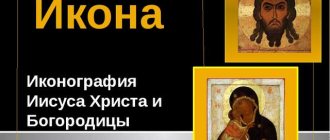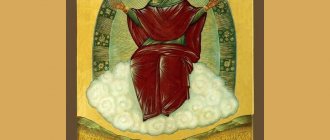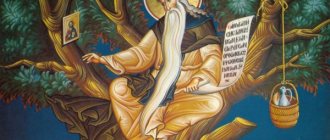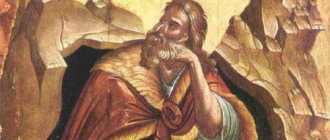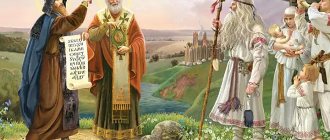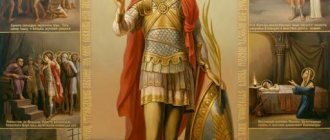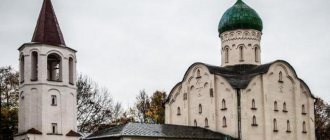Priest Afanasy Gumerov answers:
Dream of Joseph the Betrothed
The most reliable information about St.
righteous Joseph the Betrothed are in the Gospel. They are few, but they are precious. His very election by Divine Providence to preserve the virginity of the Most Holy Theotokos speaks of his high moral purity. How much spiritual nobility is revealed by his desire to secretly let go of his wife, who was not idle. With complete trust in God and submission to His will, the 80-year-old St. Joseph abandons his patronymic name and flees to Egypt to save the Child. He shows touching concern for the Child Jesus: “Behold, Your Father and I sought You with great sorrow” (Luke 2:48).
At this time, Righteous Joseph was over 90 years old. Researchers suggest that St. Joseph died before the public ministry of Jesus Christ began. He is no longer mentioned in any of the Gospels.
The church tradition recorded by the Byzantine historian Nicephorus, who followed the Hieromartyr Hippolytus (3rd century), allows us to expand our knowledge about this saint. The information preserved in legend was included in the life of St. Saint Joseph, compiled by Saint Demetrius of Rostov (December 26). He came from the royal family of David. His parent was Jacob, who, according to the rules of levirate marriage, married the widow of his brother Eli, who died childless. In accordance with the law, Eli was considered the father of the born son (Joseph). St. was married. Joseph on Solomiya. She was the daughter of Haggai, brother of St. Prophet Zechariah - father of St. Prophet and Forerunner John. They had 4 sons (Jacob, Simon, Judah, Josiah) and 2 daughters (Esther and Tamar). In the Synaxar (the week of the myrrh-bearing women) it is also said about the third daughter - Solomia, who was married to Zebedee - the father of the apostles John and James. At the time of his engagement he was about 80 years old. He died, according to legend, at the age of 110. The burial place is not mentioned. His memory, together with the prophet David and the apostle James, is celebrated on the week after the Nativity of Christ (the first resurrection after the great holiday). There is an Akathist to St. righteous Joseph the Betrothed (Akathistnik, book 1, Nizhny Novgorod, 1995). A separate iconographic image is posted on the Orthodox Calendar website.
May 11, 2004
Excerpt characterizing Joseph the Betrothed
- Fine! Fine! Fine! - But how can you say this in Russian?.. When Pierre returned home, he was given two posters by Rastopchin that had been brought that day. The first said that the rumor that Count Rostopchin was prohibited from leaving Moscow was unfair and that, on the contrary, Count Rostopchin was glad that ladies and merchant wives were leaving Moscow. “Less fear, less news,” the poster said, “but I answer with my life that there will be no villain in Moscow.” These words clearly showed Pierre for the first time that the French would be in Moscow. The second poster said that our main apartment was in Vyazma, that Count Wittschstein defeated the French, but that since many residents want to arm themselves, there are weapons prepared for them in the arsenal: sabers, pistols, guns, which residents can get at a cheap price. The tone of the posters was no longer as playful as in Chigirin’s previous conversations. Pierre thought about these posters. Obviously, that terrible thundercloud, which he called upon with all the strength of his soul and which at the same time aroused involuntary horror in him - obviously this cloud was approaching. “Should I enlist in the military and go to the army or wait? – Pierre asked himself this question for the hundredth time. He took a deck of cards lying on his table and began to play solitaire. “If this solitaire comes out,” he said to himself, mixing the deck, holding it in his hand and looking up, “if it comes out, it means... what does it mean?” He didn’t have time to decide what it meant when a voice was heard behind the office door the eldest princess asking if she could come in. “Then it will mean that I have to go to the army,” Pierre finished to himself. “Come in, come in,” he added, turning to the prince. (One eldest princess, with a long waist and a petrified face, continued to live in Pierre’s house; the two younger ones got married.) “Forgive me, mon cousin, for coming to you,” she said in a reproachfully excited voice. - After all, we finally need to decide on something! What will it be? Everyone has left Moscow, and the people are rioting. Why are we staying? “On the contrary, everything seems to be fine, ma cousine,” said Pierre with that habit of playfulness that Pierre, who always embarrassedly endured his role as a benefactor in front of the princess, acquired for himself in relation to her. - Yes, it’s good... good well-being! Today Varvara Ivanovna told me how different our troops are. You can certainly attribute it to honor. And the people have completely rebelled, they stop listening; My girl started being rude too. Soon they will start beating us too. You can't walk on the streets. And most importantly, the French will be here tomorrow, what can we expect! “I ask one thing, mon cousin,” said the princess, “order me to be taken to St. Petersburg: whatever I am, I cannot live under Bonaparte’s rule.” - Come on, ma cousine, where do you get your information from? On the contrary... - I will not submit to your Napoleon. Others do whatever they want... If you don’t want to do it... - Yes, I will do it, I’ll order it now. The princess was apparently annoyed that there was no one to be angry with. She sat down on a chair, whispering something. “But this is being conveyed to you incorrectly,” said Pierre. “Everything is quiet in the city, and there is no danger.” I was reading just now...” Pierre showed the princess the posters. – The Count writes that he answers with his life that the enemy will not be in Moscow. “Oh, this count of yours,” the princess spoke angrily, “is a hypocrite, a villain who himself incited the people to rebel.” Wasn’t he the one who wrote in those stupid posters that whoever he was, drag him by the crest to the exit (and how stupid)! Whoever takes it, he says, will have honor and glory. So I was quite happy. Varvara Ivanovna said that her people almost killed her because she spoke French... “But it’s so... You take everything to heart,” said Pierre and began to play solitaire. Despite the fact that the solitaire had worked out, Pierre did not go to the army, but remained in empty Moscow, still in the same anxiety, indecision, in fear and at the same time in joy, expecting something terrible. The next day, the princess left in the evening, and his chief manager came to Pierre with the news that the money he required to outfit the regiment could not be obtained unless one estate was sold. The general manager generally represented to Pierre that all these undertakings of the regiment were supposed to ruin him. Pierre had difficulty hiding his smile as he listened to the manager’s words.
Ratings
- See Litany of Saint Joseph.
- According to some archaeological research, Nazareth may have been a small village with very modest houses adjacent to rocky caves; See: Reed, Jonathan L. (2000). Archeology and the Galilean Jesus. Re-examining the evidence. Harrisburg, Pennsylvania (USA): Trinity Press International. ISBN 1-56338-394-2. clause 13.
- Some people think that the expression "putative father" (which is usually abbreviated as "PP") of Jesus refers to Joseph, that is, the one who was or was believed to be the father of Jesus, but this is not the case.
How to ward off evil spirits on the “terrible day” of January 11
To protect the baby from evil, bread, a fish bone, a coin and a thistle were placed in the cradle.
To ensure that the baby slept peacefully, a spindle was placed in the girl’s crib, and an arrow was placed in the boy’s crib. The child was baptized three times and a knife, ax and sickle were left on the threshold of the room. It was believed that they would become protection against dark forces.
To remove the evil eye from an unlucky person, they collected the linen from his bed and lit a large fire from it. Then special words were said over the flame: “As troubles came, so they left me, as grief was brought, so it was burned at the stake.”
The ashes were scattered to the wind so that trouble could no longer return to the house. To live a life of prosperity and wealth, fish scales were laid out in seven small piles. They put a coin on each and started talking. Afterwards, the money was hidden in a secret place, and the scales were buried away from the house.
To avoid conflicts in the family, the housewife swept the floor in the house, took the garbage to the threshold and said three times: “The evil force, go away, take away all the scandals.” Afterwards, the garbage had to be buried under a dry tree.
The meaning of the name and position of Jose
Saint Joseph the Carpenter, Georges de La Tour.
Oil on canvas, 1640s. Louvre, Paris. Jose
(or
Joseph
in its archaic Spanish transcription used until the early 19th century) is a masculine name of Hebrew origin, derived from
yôsef
(יוסף) "to add", from the verb
lehosif
(להוסיף) "to add".
An explanation of the meaning of this name is found in the book of Genesis
.
Then God remembered Rachel. God heard her and opened her womb, and she conceived and gave birth to a son. And he said, “God has taken away my shame.” and Joseph called him, as if saying: “May the Lord give me another son.”
Being
30,22-24
.
The fact that José de Nazareth is mentioned as the alleged father
Jesus, [Note 3] would have given rise to the Castilian abbreviation
Pepe
, derived from the set of both initials.
[ 16 ] [ ] However, others think it is a shortened version of Giusepe
(an older version of the name in Spanish). [ 18 ]
The Gospel of Matthew in Greek indicates that Jesus of Nazareth was "the son of a craftsman" (Matthew 13:55a), and the Gospel of Mark states that Jesus himself was made of this craft: "Is not this a craftsman?" (Mark 6:3).
The Greek term used in both cases, "τεχτων", does not correspond specifically to "carpenter", but to "artisan", "worker"[19], although Joseph is more often said to have been a carpenter. In fact, this is how it is often translated in most Bibles, including the Jerusalem Bible: "Is not this (Jesus) the carpenter's son?" (Matthew 13:55a). [ 20 ]
Josephology
This is the oldest depiction of the Villa Insurgentes from 1800–1801, venerated in the parish of San José del Calabasal.
Saint Joseph in his youth with a flower staff. Oratory of the Australian University Hospital, Pilar, Argentina. San José de la Hermandad de los Desamparados (San Fernando, Spain). The image shows a flowering staff, one of the symbols of José de Nazareth since the 5th century. Nowadays, some Catholic theologians claim that Joseph ascended to Heaven in body and soul; [ 44 ] Some even claim that Joseph was pure from the moment of his conception. However, none of these positions were filled by the magisterium of the Catholic Church. “Josephology” as a branch of theology that studies Joseph of Nazareth is in constant development. [45]
external reference
- San Jose Obrero at Primeroscrostianos.com
- The Vocation of Saint Joseph at Primeroscrostianos.com
- Seven resurrections of St. Joseph at Primeroscrostianos.com
- History of Joseph the Carpenter (in French), with introduction and comments on the website of Philippe Remacle (1944-2011).
| Control of authorities |
|
- Data: Q128267
- Multimedia: Saint Joseph
About the holiday
On March 19, the Catholic Church honors the memory of St. Joseph, betrothed to the Blessed Virgin Mary. In some countries, St. Joseph's Day (Feast of St. Joseph) is an official national holiday; in some countries, fathers are honored on this day, for example, in Spain and Italy. Saint Joseph came from the line of David. While a carpenter in Nazareth, he became engaged to the Virgin Mary, but before they were married, his bride conceived by the Holy Spirit. When her condition became clear, Joseph was embarrassed and even contemplated Mary's adultery. Therefore, he intended to part with her “quietly,” that is, without publicity, secretly letting her go. However, an angel who appeared to Joseph in a dream told him that the baby Mary was expecting was a gift of grace from the Holy Spirit. Joseph accepted Mary and lived with her in a virgin marriage. Since 1870, Saint Joseph has been the patron saint of the universal church, as well as order societies, brotherhoods and unions bearing his name. He is revered as the patron saint of spouses and Christian families, children, youth, virgins, orphans, educators, travelers, prisoners, the dying, as well as workers and artisans, woodcutters, engineers, and sappers. In addition, Saint Joseph is considered the patron saint of Belgium.
Folk signs, signs for the weather on January 11
- North wind in the absence of clouds means frost will come soon.
- Blizzard - July will be rainy.
- Bright and twinkling stars mean cold weather.
- The windows are fogged up - there will be a thaw.
- At sunset the Sun sets in the fog - there will be a blizzard.
- The sky is clear, but the sun is shining unclearly, a little blurry - the weather will worsen.
- In the evening, a strip of clear sky appeared on the western side - the weather will improve.
- The chickens roosted earlier than usual - in anticipation of frost.
- If the chickens climb very high, the frosts will last for a long time.
- Warm day - spring will be early.
A dream on the night of January 11th foretells the future. It can be confusing, so it needs to be deciphered to get an accurate answer.
Those born on January 11th are bright and active people who cannot sit in one place, so they always find adventures. They are very optimistic; if they fail, they will not give up and will definitely cope with any problems.
